“Bar Association”
Written by Barbara J. Lee & Jenifer A. Lee and Ira Steven Behr & Robert Hewitt Wolfe
Directed by LeVar Burton
Season 4, Episode 15
Production episode 40514-488
Original air date: February 19, 1996
Stardate: 49565
Station log: The Defiant returns from a five-day trip to the Gamma Quadrant, having encountered no Jem’Hadar ships. Worf and Dax discuss some technical issues with the Defiant, and Dax notices how much Worf loves being in charge of Starfleet’s only warship.
It’s the Bajoran Time of Cleansing, a month in which Bajorans give up all earthly pleasures. As a result, business is poor in Quark’s, so the proprietor is in a pissy mood. When Rom collapses from an ear infection, Quark’s only response is to dismissively say he’s going to dock Rom’s pay for sleeping on the job and instructing another waiter to clean up the mess he made when he fell down.
It turns out that Rom has had the ear infection for three weeks, and Bashir says it could’ve killed him if it went on for much longer. Rom hadn’t been getting his regular ear-scan, and besides, he can’t take time off for any reason, including visiting the doctor’s—it’s in his employment contract. When Bashir suggests forming a union, Rom points out that Ferengi workers don’t want to stop the exploitation, they want to advance to the point where they become the exploiters.
Quark then announces that the time of cleansing has devastated his profit margin, so he announces that everyone is getting their pay cut by a third. The alternative is to lay off half the staff. (Quark is appalled that the staff isn’t more grateful.) Rom urges Quark to reconsider, which he won’t do, so Rom gathers the staff and encourages them to form a union. Enthusiasm for such a notion is not great, as the Ferengi Commerce Authority can destroy a Ferengi who even talks about a union. But Rom rallies the troops to strike a blow against Quark, the FCA, and exploitation.
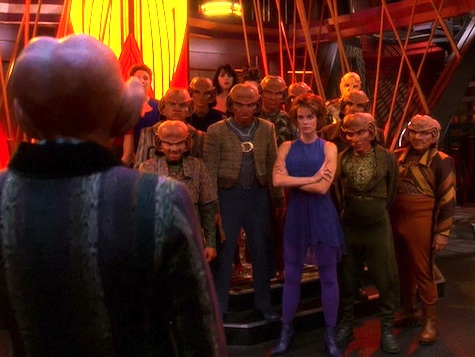
Dax and Worf are returning from the holosuite when they capture a thief who has in his possession Worf’s tooth sharpener. Worf brings him to Odo’s office, where the Klingon bitches that security breaches like this didn’t happen on the Enterprise. Odo smiles, as if he’s been waiting weeks for Worf to make a remark like this, and he proceeds to grab a padd on which he’s got called up the Wikipedia entries for “Rascals” and “A Matter of Time.” An open port of call like DS9 is a lot harder to secure than the flagship of the Federation, so stuff like this is going to happen and Worf is gonna have to get used to it, even though it irritates him.
Rom goes to Bashir for advice on union-forming while he’s treating O’Brien for a cyst, and while Bashir is cautious, O’Brien pushes Rom to go for broke and strike—which he does, presenting Quark with a list of demands. Quark laughs in their faces, so they go on strike. Quark continues to laugh until they all walk out and stand in front of the entrance encouraging people not to come into the bar.
Quark purchases a program from a Lissepian that will provide holographic waiters, but it doesn’t work very well, and Odo is under orders from Sisko not to do anything about the strikers as long as they remain peaceful and allow access through the second floor.
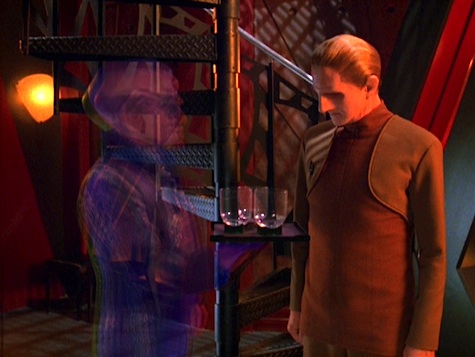
Bashir and O’Brien sit on the Promenade, taking friendly bets on who’ll walk by Quark’s and enter and who’ll pass by. To their surprise Worf actually crosses the picket line and enters, which leads to a violent disagreement that ends with the trio in a holding cell. After Sisko chews them out (and leaves the three in a single cell overnight), the captain meets with Quark. Sisko wants Quark to settle the strike, but Quark can’t, as even talking to strikers violates Ferengi law. Sisko’s less interested in Ferengi law than he is in who holds the lease on Quark’s Bar: the Federation, who haven’t charged rent, asked for maintenance fees, or charged for the bar’s power consumption. Sisko offers Quark a simple choice: provide the Federation with back pay for all that stuff, or talk to his brother. Quark, unsurprisingly, goes for the latter option.
Quark’s first instinct, of course, is to bribe Rom to end the strike. Rom refuses, instead quoting Karl Marx and Freidrich Engels: “Workers of the world unite: you have nothing to lose but your chains.” Quark is horrified, wondering what happened to his brother, and leaves.
And then Liquidator Brunt of the FCA shows up, with two Nausicaan enforcers. He’s there to help Quark end the strike. He walks in on the strike meeting. If they were on Ferenginar, they’d all be condemned to be tossed off the spire of the Tower of Commerce—but they’re not on Ferenginar, and they’ve been exposed to unwholesome Bajoran and Federation values. However, if they don’t go back to work the next morning, their accounts on Ferenginar will be seized and their families fined. But after he leaves, Rom points out that if their accounts on Ferenginar were such a big deal, they wouldn’t be waiters in a bar in the Bajoran system. So the strike continues.
After Rom walks Leeta to her quarters (she even kisses him on the forehead), Quark urges Rom to stop the strike, or the FCA will get serious. They answer to no one, and the Nausicaans aren’t for show. They could make Rom disappear and Quark won’t be able to protect him. But Rom—who has spent his entire life being bullied and put down by Quark—figures that if Brunt gets rid of Rom it solves all Quark’s problems.
Sure enough, Brunt says that he needs to make an example of someone—but, it turns out, it isn’t Rom that he’ll target. Go after the leader of a movement, you risk making a martyr. Instead, he needs to hurt someone Rom cares about: Quark.
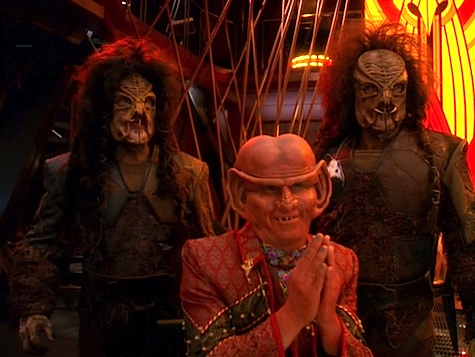
One severe beating later, Rom visits a badly injured Quark in the infirmary. Rom is actually gloating, since their positions are nicely reversed from earlier when Rom collapsed from the ear infection, but Quark is not going to press charges against Brunt and the Nausicaans (which is totally the name of my next band). Even if he did, the FCA would just send another liquidator.
But Quark has an alternate plan: if Rom dissolves the union, Quark will quietly, off the books, give in to all of Rom’s demands, from raises to sick leave.
Worf talks to O’Brien, first to apologize for the brawl, and then to announce that he’s going to live on the Defiant. When he actually moves on board, Dax gives him a housewarming gift of her favorite Klingon operas, which he can play as loud as he wants on the Defiant comm system when he’s alone on the ship. Dax, just like Odo and O’Brien before him, tell him that he’s going to have to get used to life on the station, but Worf finally begs to differ—perhaps it’s everyone else who’ll have to get used to him.
The Bajoran cleansing ritual is over, as is the strike, and everything in Quark’s is back to normal—with one major exception. Rom quits working for Quark’s and has signed on with the Bajoran Militia as a junior diagnostic engineer on the night shift. He promises to still do maintenance for Quark on the holosuites and replicators, but he needs to be his own man. Quark very reluctantly agrees, and gets him a snail juice, as he’s a paying customer now.
Can’t we just reverse the polarity? When Worf expresses annoyance to O’Brien about the technical difficulties on the station, O’Brien opines that he loves it so much more than the Enterprise because everything on the flagship worked. He was bored to tears most of the time…
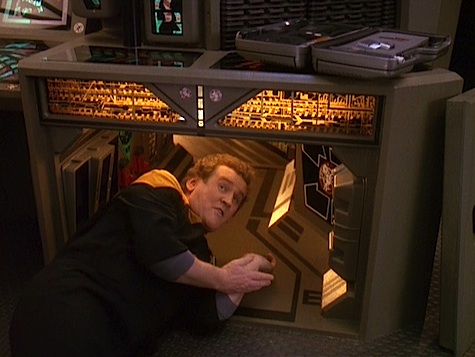
The Sisko is of Bajor: Just like in “Emissary,” Sisko blackmails Quark into doing the right thing. The scene in which he does so is a masterpiece of comic timing between Avery Brooks and Armin Shimerman.
Don’t ask my opinion next time: Kira’s only line in the episode is to break her time-of-cleansing fast with an eagerly ordered double hasperat and two synthales.
The slug in your belly: Worf has been tutoring Dax in the use of the mek’leth, following her admitting that it was a cool weapon in “Sons of Mogh,” and she’s getting the hang of it, which Worf only admits reluctantly.
There is no honor in being pummeled: Worf is still having trouble adjusting to life on the station, and he finally decides to take action. Since he’s in charge of the Defiant, and since he is, as Dax jokingly put it, in love with the ship, he moves permanently onto the vessel.
Preservation of mass and energy is for wimps: Odo actually is on Quark’s side when the strike hits, as he views strikes as being messy and antithetical to his sense of order.
Rules of Acquisition: Ferengi society and law both frown on unions and strikes—it’s a struggle for any of the Ferengi to even say the word “union.” Rom and Grimp quote two Rules at each other: #263 (“Never let doubt interfere with your lust for latinum”) and #211 (“Employees are the rungs on the ladder to success—don’t hesitate to step on them”).
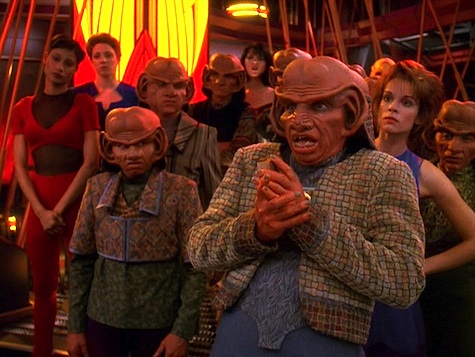
Tough little ship: The Defiant still doesn’t have all the kinks ironed out of it—Worf notices some sluggishness in the inertial dampeners—which Dax thinks will disappoint O’Brien after all the work he’s put into it.
Victory is life: Several times, Starfleet has ignored the warning received in “The Jem’Hadar” that any journey through the wormhole would be treated as an act of war, and in this particular episode they seem to be calling the bluff more formally, as it’s implied that Worf was ordered to take the Defiant into the Gamma Quadrant specifically to see if there’d be a response from the Dominion—which, after five days, there was not.
What happens on the holosuite stays on the holosuite: O’Brien brings Bashir into the holosuite for a program that re-creates the Battle of Clontarf, with O’Brien as King Brian Boru—O’Brien claims to be a direct descendent of Boru.
No sex, please, we’re Starfleet: Worf and Dax are still flirting with each other in multiple ways, from holosuite swordplay to verbal teasing (well, with Worf it’s not so much teasing as admonishing). Meanwhile, Rom obviously has a crush on Leeta, and Leeta is actually impressed by Rom in this episode—but Leeta’s also dating Bashir (she even compliments him on how good his legs look in his 11th-century Irish fighting garb).
At one point when Rom is talking to Leeta, he says his ear infection is probably from too much oo-mox. When Leeta asks who the lucky female is, he says he’s giving himself oo-mox, and when Rom (impressively brazenly) asks if Leeta can help, she says that Bashir may not approve, and Rom says she should ask him. This marks the first time Star Trek has referenced masturbation or polyamory, and it’s all in the same conversation…
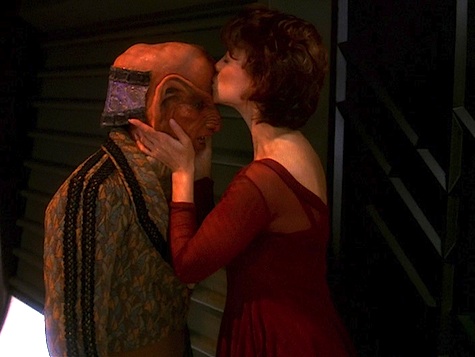
Keep your ears open: “I thought you weren’t afraid of the FCA?”
“I lied!”
Grimp and Frool when the latter grovels before Brunt.
Welcome aboard: Max Grodénchik and Chase Masterson are back as Rom and Leeta, while Jeffrey Combs’s Brunt officially becomes a recurring character by appearing again after “Family Business.” Jason Marsden and Emilio Borelli play Grimp and Frool. Professional darts players James Lomas and Shawn McConnell play the Nausicaans—they were cast specifically for the scene where the two enforcers throw darts at each others’ chests.
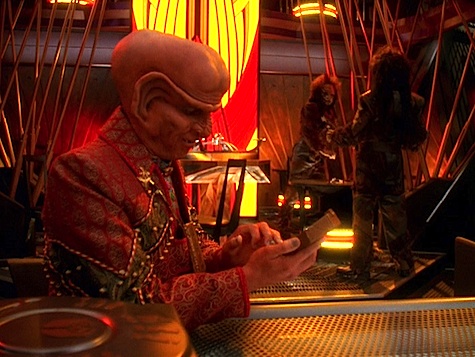
Trivial matters: While many fans thought Sisko’s harangue of Worf, Bashir, and O’Brien following the bar brawl was based on Kirk’s dressing down of Scotty, Chekov, and the others involved in the brawl in “The Trouble with Tribbles” (a dressing down that O’Brien and Bashir would become part of in “Trials and Tribble-ations”), Ira Steven Behr in fact based it on a scene in John Ford’s Fort Apache, when John Wayne’s Captain York upbraids three of his sergeants.
Armin Shimerman, who sits on the Board of Directors of the Screen Actors Guild, lists this episode about labor relations as one of his favorites.
Worf’s tooth sharpener, which was stolen from his quarters, is the one he bought from Nog before the latter went off to the Academy in “Little Green Men.”
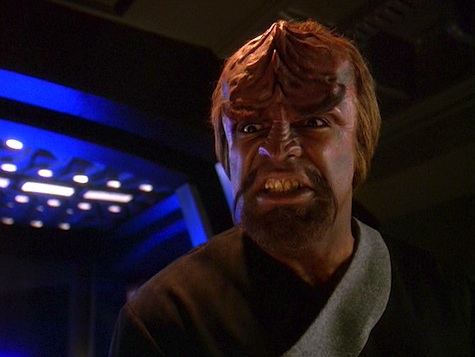
When the pitch for this story by Barbara J. Lee & Jenifer A. Lee was bought, it was intended to be used as a B-plot for one of the other stories this season, but it rapidly became clear that it dealt with issues too important to so relegate.
Walk with the Prophets: “Making me feel dumb made you feel smart.” I find myself loving this episode even more upon rewatching it because unions have come under such fire in recent times, and this is a classic reminder of why they came into existence in the first place, and how important they are. Using the Ferengi is a masterstroke, because they take exploitation to the max, but the lessons of this episode hold true anyhow. It’s classic Star Trek, using an alien species to illuminate a human issue, and while the allegory is in its own way as heavy-handed as that of “Let That Be Your Last Battlefield…”—especially with O’Brien waxing rhapsodic about his miner ancestor who died for workers’ rights in the early twentieth century—it’s far more effective because it isn’t played broadly.
In fact, this is one of the better Ferengi episode precisely because it isn’t played to ridiculous extremes. The shrill ludicrousness of the Ferengi is hardly seen at all here—even Frool’s groveling is played more as something pathetic than something funny. The episode takes the situation seriously.
More to the point, it takes Rom seriously, and Max Grodénchik is up to the task of being something other than comic relief. We’ve seen flashes of Rom taking charge of his life before, but in the past it was always related to other people—Nog in “Facets,” Ishka in “Family Business.” Here, it’s for himself, and it’s a great next step. I particularly like the way that Rom takes Quark’s usual digs—wishing he was an only child, emphasizing that Rom’s his employee not his brother—and throws it back in Quark’s face when Quark tries to play the family card in order to stop the strike.
And our insight to Quark is important, too. He does care about Rom, but it takes a lot to get him to remember that. He wants to be a good Ferengi who exploits everyone, which is why he lets Rom lie on the deck (well, that and he’s pissed about the lost business from the cleansing festival), but when push comes to shove, he wants to protect Rom, even after he gets beat up by the Nausicaans.
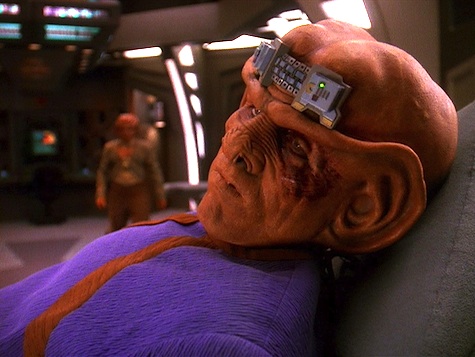
In the end, though, Rom doesn’t need Quark’s protection anymore, which is why the move to quit and become an engineer is the right one for the character to take.
Plus we get Jeffrey Combs back as Brunt. Whoever had the idea to give Brunt tiny tiny lobes should’ve gotten a raise, as he’s the classic bureaucrat, and Combs’s oily charm works magnificently.
The B-plot is a nice continuation of Worf fitting in, and I admire the step he takes here. Like Rom, he’s tired of trying to make the existing situation work, so he changes the situation, in his case by moving onto the Defiant. And they’re also taking advantage of the chemistry between Michael Dorn and Terry Farrell to move the Dax-Worf pairing forward, which is working out very nicely. Mention should also be made of the fact that, for the second time in four episodes, Odo and Worf have provided one of the most hilarious scenes extant, in this case with Odo throwing the takeover of the Enterprise by Ferengi doofuses and Berlinghoff Rasmussen’s con game in his face. I particularly adore that Odo had that padd just sitting there on his desk, waiting for the time when Worf would get snarky about the security on the station.
Warp factor rating: 9
Keith R.A. DeCandido reminds everyone that The Klingon Art of War is available for preorder from Amazon, Barnes & Noble, Indie Bound, or directly from the publisher. It’ll be out in May, and he’ll be debuting it at TrekTrax Atlanta at the end of April.











I am pretty sure we watched this one really close to Ash Wednesday, so the cleansing festival was kind of apt.
Also, unions! I live in Wisconsin, so that whole issue is kind of a big deal here! And I have to admit some of my favorite encyclicals are the labor ones.
Probably because unions aren’t what they used to be. The number of members in private sector unions is declining while the membership of public sector unions is increasing. It’s kind of hard to put the government in the role of the management exploiting the working class that is the classic union image. In theory the government exists to provide service to the public and is responsible to the public through our elected officials. So the workers are also the bosses. On the public side the unions have themselves become businesses with the primary purpose of protecting their own existence. Getting better deals for the workers / members is second. Or third, looking at the paychecks of some union officials. Long gone are the days when a union was all that stood between working for scraps in an unsafe environment. These days most employees are also shareholders in the company they work for, through their pension plans at the very least. Most companies understand that having engaged, respected employees who are fairly treated and like their jobs is much more profitable and sustainable in the long term. Which is the solution they come to here in the end of the episode.
There will always be those out there intent on demonizing unions, and while some of the complaints might be valid, the truth is we wouldn’t have basic working rights if it weren’t for them. Given the current state of capitalism today, it isn’t surprising to see such a strong voice against unions.
The 2007 writers’ strike wasn’t that long ago. Today, we have outstanding shows like Mad Men, Breaking Bad, amongst others. And the reason we have them is because someone fought battles to preserve the writers behind these shows, not only by defending their artistic vision, but by defending their basic working rights and enabling their livelihood. Otherwise, you couldn’t make a living solely as a writer.
Having said that, this is definitely one of my favorite Ferengi episodes. Once again, Ira Behr and Robert Wolfe take the situation seriously and make us care about the characters involved, despite the way the Ferengi were initially designed back in the 80’s.
It’s good, but I think I’d rate it a little lower than a 9. A lot of the important character moments are part of a long continuum and are really only clear when we know where they end up. This is especially true for the Worf/Dax pairing. When this first aired, it just felt like Dax was doing a but of flirting and nothing more. But I do give them kudos for advancing that relationship slowly and believably rather than the usual “character falls for guest star of the week”.
I also felt like the writers wrote themselves into a corner and had to do a bit of handwaving to resolve matters. I see no reason why any of Quark’s employees should believe he would keep this deal. I’m sure there must be a rule that is the Ferengi equivalent of “An oral agreement is worth the paper it’s printed on.”
There have been several episodes to show the lack of HIPAA in Starfleet…but here, Rom walks right up to Bashir when he’s with a patient. Kind of amusing.
Also, I love how they threw in a line about O’Brien being bored to tears in the transporter room.
Someone once pointed out to me that a strike is a breach of contract. It requires refusing to do something you signed a contract to do. Unions get away with it only because they lobbied to get themselves granted immunity from that law or, in some jusrisdictions, from any law at all.
So the Ferengi really should find Roms actions horrifying. They are a direct violation of the 17th Rule of Acquisition (A contract is a contract is a contract… among Ferengi), and must be seen by them as fundamentally immoral. And also illegal.
And if I agree that it is wrong to break your freely given word, I have to admit they have a point.
I forgot that prolific voice actor Jason Marsden was in this one. He’s done countless roles in animation, most notably Richie on Static Shock, Snapper Carr on Justice League, and Impulse on Young Justice, and he’s not only the only person I know of who’s professionally played both Clark Kent and Bruce Wayne, but the only one who’s played both of them and Dick Grayson. (He voiced teen Clark in Superman: TAS and young Bruce in Beware the Batman, he did the voice of “Scooby-Doo Robin” in Batman: The Brave and the Bold, and he played Burt Ward playing Robin in the live-action docudrama Back to the Batcave.)
The main thing that bugs me is that we never saw this month-long Bajoran cleansing ritual before or since. Are we to believe that no other episodes took place during that month of the Bajoran calendar? Or is the Bajoran year just really long? Come to think of it, how long is a Bajoran month? They’ve got something like five moons, so defining a month could be a pretty complicated process.
Last week was euthanasia, this week unions. This is going to be fun.
#3
Now, now, who are we to judge the Ferengi? If Quark wants to abuse his workers, he has the right to do so. It’s the Ferengi way after all. Profit comes first. Different cultures and all that.
Kidding, of course.
@6: It very much depends on the labor law in the respective country – I’m not sure, but I believe usually employers do not have to pay wages for the time of the strike (I may well be wrong, and that’s just a German specialty), so it’s more of a temporary suspension of the contract with the explicit purpose of renegotiating its terms, with the option to fall back on the previously agreed-on terms if no agreement is reached (which is the main difference to a mass quitting).
What surprised me more is the disapproval Ferengi show for unions in general – I didn’t get the impression in the past that they persecute cartels, so what’s supposed to be different about a workers’ cartel?
I still think Odo had that PADD ready after the events of “Hippocratic Oath”.
If the Klingon had ruined one of my sting operations, then I’d want to bust Worf’s chops at the first opportunity too.
@10 If I agreed to supply you with a lifesaving drug everyday and then, when you had no alternative source of supply, stopped the deliverys while we “renegotiated the terms” I don’t think you would regard me as having kept my word! So in the ordinary use of language, I would be breaking the terms of the contract, whatever legal euphamism has been invented to hide this.
In this case, the union existed to allow and encourage its members to break the terms of their contracts. And the Ferengi regard this as immoral, so they should persecute the union.
But of course, the Ferengi are ficticious characters. They think what their writer wants them to think. And Trek conceived them as “Evil Capitalists” who would naturally be in favour of “Evil Cartels” and opposed to “Noble Unions”. So they are.
To be honest, I have always been slightly unhappy about they way the Ferengi are depicted as being so similar to the old stereotype of evil Jewish capitalists and speculators. An old clannish racial group, proud of their ancient history, regarded with dislike and mild contempt by most people, working for their own selfish speculations rather than nobly serving the People!
Still, a lot of trade diasporas have been seen like that. They must have said the same about Lebanese and Armenians…
1. Most employer/employee arrangements are not contracts.
2. If Quark’s employees were on contract, then he would be violating the contract as well by lowering their pay.
1 Every employer/employee arrangement I have had has involved a contract.
2 You can certainly alter such an contract, subject to notification.
3 Quarks employees do have contracts. We are explicitly told that Rom has one.
4 It is possible they have no notice period, but historically this would be very unusual in the real world. You would expect this only where there were many alternative employers and employees so that new jobs or employees could be arranged on short notice. If Quarks bar was in this position, he could just hire new people to replace the strikers. In other circumstances, both parties are likely to want security, which implies a notice period.
My husband and I are in very different fields and have had very different types of jobs. We’ve both always had to sign contracts.
I can’t recall if it was this episode or another one, but they have talked about Quark’s contracts being full of fine print that many of the employees never bothered to read (or weren’t able to make sense of). And that this fine print was full of very unusual clauses — Quark often says “it’s in your contract.” I think one of them was about the dabo girls being conractually obligated to give him oomox or something like that.
So the implied fact is that Quark can indeed do all of these rotten things to his employees because the contracts explicitly give him those rights, and the employees signed that they agreed to him having those rights.
Strikes are indeed a breach of contract. I would not argue that. However, they are generally in protest of a contract which is deemed to be unfair, so there is an allowable forgiveness based on justice and ethics. Perhaps there was a change in working conditions not covered for in the previous contract, perhaps the contract was signed under duress or false pretenses, or even there was no written contract but only a verbal agreement which the employer then reneged on — the workers then having the right to break contract because the employer did first.
In other cases, it’s not a breach of contract at all, but a breakdown of negotiations after the old contract expired. You often hear of things like “the nurses have been working without a contract for 2 years now, the union is preparing for strike action if there’s no movement soon”. That’s obviously not the case in this episode, but for the sake of completeness I just thought I’d mention it.
Apparently, Ferengi are really bad at negotiating employment contracts when they are on the employee side, but become masters when on the employer side (Rom has the excuse that he is notoriously bad at stereotypical Ferengi skills). If an employee has skills that significantly improve a business’s profit margin, an employer going to strive to keep that employee happy. Also, if the working conditions at Quark’s are this ridiculously unacceptable, why are any non-Ferengi working there, Ferengi law has no jurisdiction over them on a Federation/Bajoran station? The Ferengi culture as presented is an absurd caricature of a market economy with countless internal contradictions of how it works, as a result, episodes like this come off as heavy handed propaganda. Seeing that Shimerman considers this a favorite episode reminds me of Narcisse on “Boardwalk Empire” being unable to see the flaws in his pro-“Libyan” play.
I think of a strike as being like an act of civil disobedience or self-defense, or like, well, the sort of things the Bajoran Resistance did against the Cardassians. It’s not a good act in itself, but sometimes you’re forced into a situation where the only option you have to protect yourself or change an intolerable situation is to do something improper. I don’t think anyone ever wants to go on strike — obviously, since they lose money by not working — but when faced with management that won’t negotiate in good faith, they’re sometimes left with no choice.
“Using the Ferengi is a masterstroke, because they take exploitation to the max”
Well played, Sir. Well played.
I had only watched this episode once, since I am generally not a huge fan of Ferenghi episodes, but a rewatch tonight confirmed that is was not a bad episode at all. I really enjoyed watching Rom grow into his own strong person.
I won’t get into contract law here, especially fictional Ferenghi contract law as it applies on a Bajoran station administered by the Federation, but I am a union person, born and bred, coming from a Northern community where the unions not only made for reasonable wages, it saved lives. Think mining and smelting – I am bred to see the Union side, always.
That being said, like Leeta, I am very proud of Rom.
I wonder if the traditional Ferengi stance on unions is related to their religion. Individually negotiated contracts allow for more potential profit and profit is what you use to bid on your next life. Accepting the same contract as everyone else for the same work provides identical profit which increases the pool of souls you’re bidding against after death.
Of course I doubt the writers had fully worked out the Ferengi afterlife at this point, but it is something to ponder in light of later events. That and I like the idea of Quark being the second-most religious member of the primary cast, even if he bends a little in this case. Although giving into demands does provide more overall profit than staying closed.
Not necessarily – that’s why oligopolies can be attractive for their members, and that’s essentially what a union is from an economic point of view.
@21 I imagine most working Ferengi probably see themselves as ”
temporarily embarrassed millionaires” to borrow a phrase. Which leads them to imagine themselves to be better at getting a deal than their neighbor. The fact that they aren’t rarely seems to occur to them. Nog being a fine exception to this blind spot.
@@@@@ 16. Crusader75
Frankly, most Trek cultures tend to be Planet of Hats type caricatures. The Klingon empire and the Federation are not obviously more plausible when you start to think about how they work. And I don’t think this problemis limited to Trek. It’s hard to invent a whole plausible culture from scratch.
I imagine he is thinking of the relationship between Quark and Rom, not the plausibility of the Ferengi worldbuilding. Which is the sort of thing an actor should be concerned with.
I thought it was Ward Bond as Sgt. Maj. O’Rourke who upbraided the other three sergeants for the way they disposed of the frontier whiskey “bibles” in Fort Apache.
This is an entertaining episode (I love all the Ferengi episodes), but it is based on a history of labor that is false. Unfortunately, the misrepresentation of capitalism and the role of unions in modern society has become pervasive. The history of unions is not heroic by any stretch of the imagination, and unions had little to nothing to do with the improvement of working conditions and pay that the West now enjoys. While I love the Ferengi, to describe their society as “capitalistic” is erroneous. If one actually reads Adam Smith’s classic work The Wealth of Nations, upon which the free market system is based, it’s pretty evident that Ferengi society is mercantilist, the antithesis of the free market. Mercantilism (or “corporatism” as it is called today) is an economic system that is heavily regulated (think of the FCA), and exists for the purpose of enriching government officials through political favors and monopolization. The fact that popular culture incorrectly defines capitalism in order to create villians only demonstrates how poorly economics and labor history are taught in the modern Western world.
I will not engage the union-bashing in some of these comments as that will be an endless debate that will only upset me. Unions have protected workers and negotiated living wages. I am a union man, and will not debate the merits of unions on this page.
Moving on, I didn’t remember Rom leaving Quark’s to work for the Bajoran Militia at the end of this episode, and it was great to see. Rom very much needed to leave his brother’s shadow, and I’m glad Rom realized the time had come.
Nobody said you have to debate. But nobody plays with someone who keeps picking up their ball and running away with it, unless that spoilsport resorts to bullying as unions do in real life.
I will gleefully bash unions. They ruin the livelihoods of just as many working class people as they help, as happened to my grandfather, an ordinary working man who saw the airline he worked for fall to ridiculous and excessive union regulations that ultimately bankrupted his employer. Unions don’t generate the resources that support their members, they take those resources from real producers, both the business themselves AND other working class people.
Unions can be and quite often are just as greedy and self centered as the caricatures that are the Ferengi. In my grandfather’s case, they proved to be worse.
I was kind of proud that DS9 had the balls to take on this subject. Pro or con, it is an interesting and important discussion.
I think a lot of people are missing the point that these are the ONLY contracts available, according to Rom. No vacation, no days off, no sick days, and the employer controls how much you get and when. You either sign such a contract and work yourself to death, or starve.
So it isn’t like unions nowadays. It’s like unions back in the days when we had children working and not going to school, or laborers getting black lung disease, or falling asleep at machinery and getting crushed to death. Ferengi workers can either sign their lives away, or somehow get rich enough to hire employees of their own.
“It’s pretty evident that Ferengi society is mercantilist, the antithesis of the free market. Mercantilism (or “corporatism” as it is called today) is an economic system that is heavily regulated (think of the FCA), and exists for the purpose of enriching government officials through political favors and monopolization.”
I don’t see this at all. It’s been shown that the richest wins as far as Ferengi government is concerned. It isn’t so much enriching existing officials, it’s that only the richest would ever get elected, and if they lose their fortune they lose their position. Also, individual Ferengi can get rich overnight, buying and selling moons, then get wiped out just as quickly. And what regulations? They can buy and sell literally anything, so long as it makes a profit. It doesn’t matter how dangerous, illegal or unstable.
I think when Odo walks into the bar and Quark vanishes into thin air, he must have been thinking “Quark was a hologram all along. That would explain so much!” Worf doesn’t move permanently to the Defiant KRAD. After he marries Jadzia, they move into quarters together on the station, and he remains there after her death.
@30 (AA). I noticed that too and it gave me a bit of trouble with this one. I just cannot believe Rom’s line that “all Ferengi labor contracts are the same”. I’d expect them to be highly individually negotiated (and probably endlessly renegotiated). I tend also to agree with @10 Torvald that I’d think the Ferengi wouldn’t abhor collective bargaining either as a mean to an end, but that’s a lesser objection for me.
There were other problems in my view – for one, why did Odo have a list of Enterprise security breaches lying to hand, assuming that that info wasn’t classified anyway (can’t see why Odo would have a need to know and is not Starfleet in any event). It played as pure fan service for TNG folks to me. Also I don’t believe the O’Brien / Worf brawl happening at all – perhaps why the writers didn’t even attempt to depict it.
@32/samus: Odo had the list of security breaches prepared because he knew he’d have a confrontation with Worf sooner or later and he wanted to be ready. He didn’t just have it lying around — he’s a police officer, and he investigated. And if Starfleet didn’t want to release that information officially, he had ways of finding out, because he’s just that good.
personally I can’t believe no one mentioned the mobile emitters that must have been used for the quark waiters. Way ahead of their time.
@34/Mike: I always assumed that the waiters were operated by a holo-diode matrix that Quark installed around the bar, basically turning the whole thing into a holosuite, rather than using mobile emitters. After all, when they fritzed out and vanished, there was no emitter left behind to fall to the ground, as far as I recall; they just vanished altogether.
Question: is Rom paid for his junior grade night shift work? Do Bajorans use currency and pay the Bajoran uniformed workers? Will he be paid in latinum? How will he pay for his drinks at the bar? What’s Kira’s salary? Is this a giant logical failure on the part of this episode?
Currency is used in all of the station’s shops and restaurants, not just Quark’s, so it’s safe to assume that Bajoran’s do use it, since it ‘s in Bajoran space and under Bajoran law. So yes, Bajoran government workes most likely get paid.
It was about time Rom stepped out of his brother’s shadow and pursued a career that’s better suited for his interests. We have seen in previous episodes that Rom can be very confident in matters that REALLY interest him (like sending Nog off to Starfleet Academy) and sometimes it was painful to watch Rom being nothing more than a doormat for Quark most of the time. Also, as a younger brother myself, I really want to see my fellow sufferer to succeed. ;)
One thing I really, really liked about this episode is that Quark, not Rom, is being punished. Rom is not afraid of the FCA and is willing to be a martyr, but I was happy to see that it didn’t happen that way, that instead Quark ate humble pie.
Has anyone else noticed an abundance of Packleds in DS9 – the very rotund aliens that steal technology they can’t understand and kidnapped Geordi LaForge once? The show seems to use them as extra traffic on the Promenade and they were shown entering Quark’s in this one during the strike.
Lockdown rewatch. I think as a young man when I first watched this episode I rather underestimated it, I always liked it because I was a fan of the Rom character, I was delighted that ‘Brunt, FCA’ returned and Leeta because, well, Chase Masterson. But I missed a lot of the important messages that only have become clear from living for 20 odd years in a world that has been slowing turning against the rights of workers. Much as the Gabriel Bell story and the Sanctuary Districts are a punch in the guts watching in 2020 so does the cheerful exploitation of the people on the bottom of the heap here. A very good episode with an important message with some delightful laugh out loud comedy moments, nothing tops Rom making what must surely be the only Masturbation joke in Trek history and also quoting Karl Marx, what’s not to love about that? The B plot is also strong, The Worf and Dax relationship continuing to develop, Odo deliciously enjoying Picking apart Worf’s security mess ups on the Enterprise..(Worf must have been really regretting that “You are to be Commended” line by now) and the move to the Defiant quarters is entirely consistent with Worf’s Character. Great episode, even more enjoyable in the rewatch than first time around.
Just a point of information to the folks who are implying everyone (I assume they are talking US, Canada, and Western Europe) have contracts for their employment; while I was working in a union shop from the age of 16 to 20, for the rest of my career the various places I was employed (one for nearly 40 years) never had contracts with their employees. It varies a great deal on where and what.
I am not nerdy enough (at the moment anyway) to think of all the examples, but for sure (even as of when this was written) Star Trek has made copious references to numerous forms of polyamory.
I’m pretty sure Seven and Mirror Kira might have said a thing or two along the lines of “Why the hell not?”. In TOS, weren’t there enough hippie cultures that some of them were unconcerned with monogamy? Weren’t there times when two alien babes were all about a threesome? I mean, if you’re going to count this episode as polyamory then that should also count. I kind of remember there being episodes with casual references to multiple marriage, like “Don’t your husbands miss you?” or whatever.
I haven’t seen Enterprise, but I’m told Dr Phloxx is poly. I am googling and I see Denobulans and Andorians, but don’t remember the episode(s) well enough.
This is some stuff:
https://memory-alpha.fandom.com/wiki/Polygamy
And I recall Voy “Warlord” which had possessed Kes attempting to establish an ongoing meaningful love relationship with a wife and a mistress. It isn’t portrayed in a very healthy light, but I remember thinking it wasn’t a case of “this one’s just for show, this one’s the one I really love” but more fluid than that.
Anyway, I’m fond of Trekkian adventuers in nonmonogamy and had to comment :)
I did say first time. The Voyager and Enterprise items you cite happened after this. As for your other examples, there was only one “hippie culture” on the original series, and their stance on relationships (sexual or otherwise) was not made at all clear in “The Way to Eden” in the least. And, as Christopher said, a threesome does not equal polyamory…..
—Keith R.A. DeCandido
“Weren’t there times when two alien babes were all about a threesome?”
Individuals’ openness to a threesome does not imply their culture’s openness to an ongoing polyamorous relationship. I mean, McCoy evidently had a wild night with a couple of Rigel II showgirls once upon a time, according to “Shore Leave,” but that doesn’t mean his views on marriage weren’t conventionally monogamous. One or two non-canonical stories have posited that he cheated on his wife (possibly with the future Nancy Crater) and that it led to their divorce, but that would be considered a failure at monogamy, not an embrace of polygamy.
In Vonda McIntyre’s novel The Entropy Effect, she established that an old flame of Kirk’s had invited him to join her group marriage, but he declined because he had traditionally monogamous values.